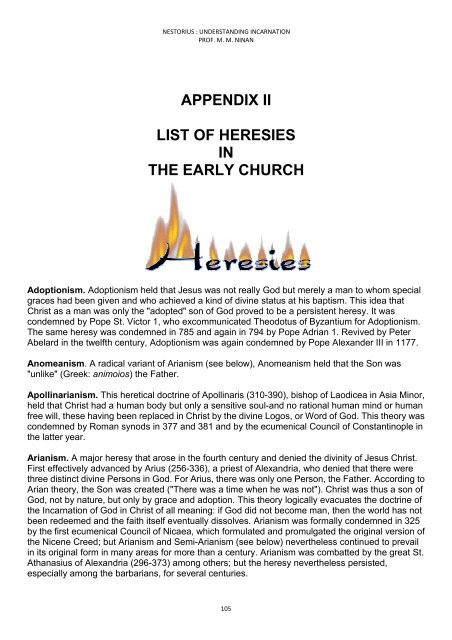Nestorius
You also want an ePaper? Increase the reach of your titles
YUMPU automatically turns print PDFs into web optimized ePapers that Google loves.
NESTORIUS : UNDERSTANDING INCARNATION<br />
PROF. M. M. NINAN<br />
APPENDIX II<br />
LIST OF HERESIES<br />
IN<br />
THE EARLY CHURCH<br />
Adoptionism. Adoptionism held that Jesus was not really God but merely a man to whom special<br />
graces had been given and who achieved a kind of divine status at his baptism. This idea that<br />
Christ as a man was only the "adopted" son of God proved to be a persistent heresy. It was<br />
condemned by Pope St. Victor 1, who excommunicated Theodotus of Byzantium for Adoptionism.<br />
The same heresy was condemned in 785 and again in 794 by Pope Adrian 1. Revived by Peter<br />
Abelard in the twelfth century, Adoptionism was again condemned by Pope Alexander III in 1177.<br />
Anomeanism. A radical variant of Arianism (see below), Anomeanism held that the Son was<br />
"unlike" (Greek: animoios) the Father.<br />
Apollinarianism. This heretical doctrine of Apollinaris (310-390), bishop of Laodicea in Asia Minor,<br />
held that Christ had a human body but only a sensitive soul-and no rational human mind or human<br />
free will, these having been replaced in Christ by the divine Logos, or Word of God. This theory was<br />
condemned by Roman synods in 377 and 381 and by the ecumenical Council of Constantinople in<br />
the latter year.<br />
Arianism. A major heresy that arose in the fourth century and denied the divinity of Jesus Christ.<br />
First effectively advanced by Arius (256-336), a priest of Alexandria, who denied that there were<br />
three distinct divine Persons in God. For Arius, there was only one Person, the Father. According to<br />
Arian theory, the Son was created ("There was a time when he was not"). Christ was thus a son of<br />
God, not by nature, but only by grace and adoption. This theory logically evacuates the doctrine of<br />
the Incarnation of God in Christ of all meaning: if God did not become man, then the world has not<br />
been redeemed and the faith itself eventually dissolves. Arianism was formally condemned in 325<br />
by the first ecumenical Council of Nicaea, which formulated and promulgated the original version of<br />
the Nicene Creed; but Arianism and Semi-Arianism (see below) nevertheless continued to prevail<br />
in its original form in many areas for more than a century. Arianism was combatted by the great St.<br />
Athanasius of Alexandria (296-373) among others; but the heresy nevertheless persisted,<br />
especially among the barbarians, for several centuries.<br />
105

















